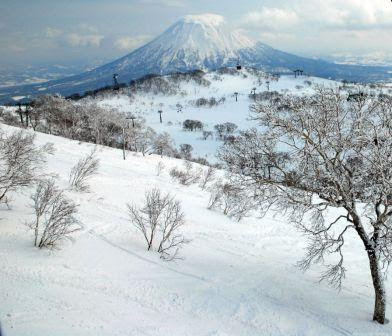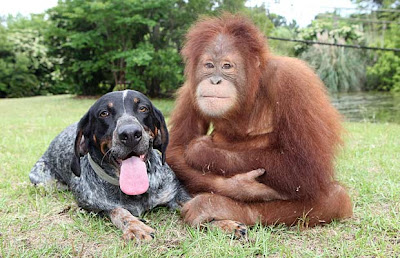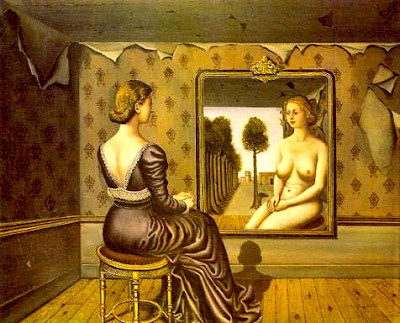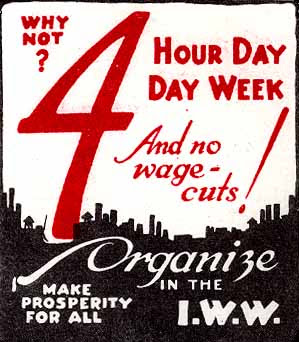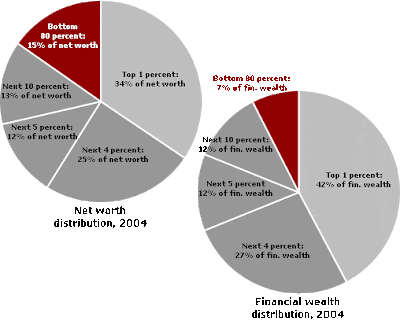 What Politics Mean
What Politics Mean
 Politics 101
Politics is the power to control or make other people do things in some way or another. Power is the first principle of politics.
Politics 101
Politics is the power to control or make other people do things in some way or another. Power is the first principle of politics.
Left and Right in politics: The major subtext revolves around the question of who is to own wealth:
Where you stand on the left/right political spectrum relates to the division of control and/or ownership of property. Property usually comes in two different forms: land (aka Nature) and capital. Property is what most people call, "the economy". Property in this sense is not your underwear, your cat, your glass, your room or your personal belongings in general, including your car and home. Property is for example: a factory, an apartment complex, a TV station, a supermarket corporation, a small business, a coal mine, a pizza franchise, a petrol station, a bank. These places, unlike your home or your cat, are where wealth and more property are created.
Property is created by everyday people like you and me. Even if it is just land, property in this sense is the mutual recognition amongst people living in a society that this or that is owned and/or controlled by this or that person or group of people and is suitable for sale. The recognition that property is for sale is codified in laws of the State. Ownership and control of the property people create and own is political because it involves "The First Principle" of politics: the power to control people or make people do things.
Most property these days is created by employing labour and using its skills to produce commodities for sale with a view to profit. Employers hire workers to use their skills to produce goods and services, which they then own and sell as commodities for profit. In combination with the natural resources which exist and are owned as property and the various pieces of land and buildings owned by landlords, these goods and services constitute the wealth of society.
The wealth of society is measured by dollars. This means that a lot of useful activities and things are not counted as important i.e. they are not valued in money. For example: parenting has no exchangeable value, because that activity doesn't make anybody else money or, doing the dishes around the house or, mowing your own lawn. However, outside the home, a group of workers may sell what they are able to do to an employer who owns a pizza parlour. The employer buys their skills and time. This becomes their wage or salary in short, their way of making a living. Once their time and skills are purchased, the workers engage in the labour associated with making and delivering pizzas. The profit created by making and delivering the pizza belongs to their employer. The wealth, which is represented in the wages which the workers get from selling their skills and time to the employer, belongs to them.
Who has control over the wealth produced by workers is the question which defines peoples' political stance as being on either the left or right. The political position of the right is that the wealth employers accumulate should remain in their hands, to do with as they please. On the other hand, the leftist position is that the people who produce wealth should be allowed to at least have
some ownership and/or control of the property they produce.
Most societies have a mix of ownership for this property/wealth. The government decides who gets what in this mix or, to go back to our first principle : the government has the political power to control or make other people do things in some way or another. In most modern societies, the government is based on the "rule of law". In democratic republics, the rule of law and the laws themselves are created and administered by elected politicians along with their appointed officials in the government's bureaucracy : for instance, the Ministry of Defence or the Ministry of Education or the judiciary e.g. the Supreme Court. In some democratic republics, some of the judiciary is elected by the people.
Democratic republics get the power to govern from the governed themselves. Everyone is supposed to be "equal under the law". The laws are made by politicians elected by the people and largely enforced by the acquiescence of the people to the law. This is known officially as, "The Rule of Law". It differs from the old "Rule of Kings", where the aristocracy was above the law--as they were officially sanctioned by God e.g. "Dieu et mon Droit". When anyone breaks the law, they are supposed to be met with the force/power of the government, that is, the people the government employs to enforce the law: the police, prison workers and the military. So, politicians represent the people who elect them. But first, they must be
selected. The selection of politicians to run for office is a fairly complicated and expensive matter, but this is where the left/right control of wealth begins to tell as people who have control of more wealth, tend to be able to amplify their voices in the selection process more than people who do not have as much wealth.
Politicians and the political parties
tend to represent either the right or the left. The key word is "tend", as none of the political parties or elected politicians are ever absolutely left or right. Politicians of the right will tend toward political decisions which end up being in the interest of the people with wealth/property, allowing them to retain control and ownership over what they have legally accumulated. Politicians of the left tend toward passing laws which result in a greater sharing of the wealth between worker-producers and the people who own the wealth which is being produced. Simply put, the further left a politician goes, the more wealth she or he will want to divert back to the poorer sections of the community and by extension, the working producers of the wealth. The more right the politician is, the more he or she will refrain from proposing or passing legislation which interferes with wealth holders. The
rightist justification will usually be framed in a manner which makes it seem that more of the community will eventually benefit, if these property holders do more of what they do best : employ workers to create more wealth.
How does this left/right axis work out for us in everyday terms?
Let us consider taxes. Taxes constitute the money (the wealth) which governments take from employers and workers to hire the police, purchase land for schools, keep the military paid and pay the garbage collectors and health care workers in States where there is a functioning public health system. The question is: who should pay the taxes to fund these government services or should there be government services at all?
The left position would tend to keep these services in the hands of government and put the question of who should pay the taxes to support them in the hands of the representatives the people elect, but always with a tendency to have the more wealthy sections of the community pay proportionally more of the tax which is needed. The right position would tend toward keeping these services in private hands or pushing them there, if they're currently under public influence, to make them profitable and not part of the governmental system at all. For example, the more right position would be for education become a profit making business, whereas the more left position would be for education to be publically funded by taxing wealth and funneling that wealth back to the education industry. As a compromise between the left and the right, the government might settle on a position whereby both public and private schools are funded to some degree by taxes collected from the public as is the case in Australia at present.
Ultimately, the question of right and left boils down to, "Who benefits"? This is the second principle of politics. The right says that the best society is one where the legal owners of property are allowed to use their control to hire workers to make more wealth. The left says that the best society is one where the owners of wealth produced by workers are legally made to share their property with those producers.
Practical everyday questions and applications of left and right:
Do those people who work for wages and salaries benefit by seeing more of their wealth or their employer's wealth being taxed away to fund government services like: schools, roads, hospitals and fire protection?
Do the people who own property benefit by seeing more of their accumulated wealth being taxed away to fund government services like: police, military, prisons, roads and hospitals or should that burden be put in the marketplace for commodities to be rationed on the ability to pay?
What actually is
necessary in a society, is a matter which revolves around the control of wealth and property. Who owns and controls property's disposal and who has the power to make the decisions in order to benefit larger or smaller portions of the society as a whole "by making people do things?"
Who controls these decisions and whom do those decisions benefit? The more these decisions benefit the vast majority of the people, the more the society is leftist. The more legislators direct the control and ownership of wealth toward the legal owners and away from the vast majority of wealth producers, the more the society is rightist.
"Who has the authority?"
The third principle of politics is based on the answer to this question, which is also intertwined with the two other principles of politics.
If politics is the power "to control or make other people do things in some way or another" and is related to, "Who benefits" from the distribution of the wealth in the society then, who is it that has this power?
Answer: it is the people who control and own the wealth produced in society. To the degree that power and authority over the wealth of society is shared equally, the society is more democratic and self-managing. To the degree that the control and ownership of that wealth is concentrated in fewer hands, the society is less democratic, more authoritarian and bureaucratic. Another way to put this is to say, the more that political power in society flows up from the majority, because of their conscious desires for self management, autonomy and sovereignty, the more democratic the society is. But, the more political power comes down on the majority from individuals above them in order to manage them, "for their own good", the more bureaucratic and authoritarian the society is.
The way these three principals intertwine and intersect make each nation different. For example: one nation can be leftist to the degree that it shares the wealth created within its borders more or less equally, but at the same time, it can be authoritarian/bureaucratic in the way that wealth is controlled. It is also possible for a country to be rightist to the degree that wealth created by worker producers is concentrated in a few hands and not shared, but still democratic to the degree that those people living within the society are free to choose politicians to represent them and free to criticize these politicians--civil liberties remain in force. Other possibilities include societies which are both rightist and authoritarian-bureaucratic or leftist and self-managing and democratic.
If it makes things easier, think of basic politics as a graph, like the one at the top of this blog. In the graph, you would map libertarian socialism in the bottom left hand corner and libertarian capitalism in the bottom right hand corner. Fascism would be in the upper right hand corner and bureaucratic socialism in the upper left hand corner. Liberal capitalist democracy would be to the right of the centre point and the liberal social democracy on the left side of the centre point and up and down as the bureaucratic or democratic tendencies would allow.
One final matter on politics as it relates to the One Big Union. Whether a member of the I.W.W. votes or not is an independent decision: it is not a union matter. Some workers would prefer to concentrate their time on direct action in support of their class interests to the exclusion of voting. Others workers see a need to take the time to vote for candidates/parties who they see as acting in their class interests by diverting more wealth back to them via governmental programs like healthcare, more democratic labour laws and so on. In any event, the I.W.W. takes no postion on
which political party, if any, to support and refuses all alliances with either poltical parties or anti-political sects. In this way, the I.W.W. steers clear of faction fighting and makes room for the creation of classwide, grassroots, democratic unionism. The One Big Union is for all workers. Whether a worker votes left, right or center, the mode of production based on the wage system will remain. A social revolution to abolish wage labour can only be enforced by the power of class conscious workers united for such a goal i.e. in One Big Union. The self-organisation of more and more producers into the I.W.W. is at the same time the new society emerging within the womb of the old.
***************************************************
I.W.W. RESOLUTION of 1908, made by delegates to the Convention of the same year:
Political Parties & Discipline
Whereas, the primary object of the Industrial Workers of the World is to unite the workers on the industrial battlefield; and
Whereas, Organization in any sense implies discipline through the subordination of parts to the whole and of the individual member to the body of which he or she is a part; therefore be it
Resolved, That to the end of promoting industrial unity and of securing necessary discipline within the organization, the IWW refuses all alliances, direct and indirect, with existing political parties or anti-
political sects, and disclaims responsibility for any individual opinion or act which may be at variance with the purposes herein expressed.
Get your I.W.W. red union card now!






